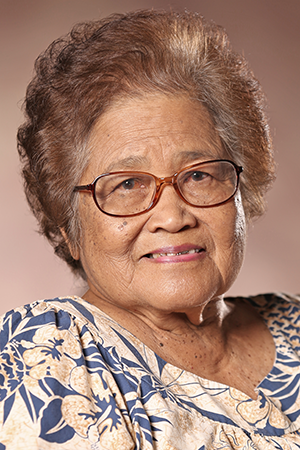From dark to lightness

Imagine that you are a child and that, like the burst of a bomb, you suddenly find yourself amidst a terrifying situation. You are in the middle of a scrambling crowd, hearing loud and terrifying sounds in the distance. You are so confused about what is happening. All you know is what you can see, hear, feel and smell. All you are aware of is that you are scared, and everyone around you is scared.
Such horrors will haunt you for the rest of your life. You may only be able to remember a few moments from that time, but those few moments remain vivid in your mind forever.
Maria Borja Meno Barcinas (1939 – 2019) was very young during World War II. She was thrust into a state of terror without any warning, or even complete comprehension of what was occurring. The first move that the Meno family made after the bombing began on Guam was to rush to a shelter.
Barcinas’s father, Jose, led his family to a hand-dug underground cave near Father Dueñas Memorial School in Mangilao. Barcinas and her older brother and sister, Gregorio and Bennie, her mother, Maria, and her grandparents hid from the Japanese soldiers inside the cave. Barcinas was very uncomfortable; she could not get used to the dank smell of the earth. The cave was very dark and frightening. The little girl soaked in the horror, which will never leave her memory.
Saw her grandmother beaten
Barcinas’s memories of the war are clips of traumatizing moments in her mind. One of these moments is when she had to watch her maternal grandmother kneel down and be beaten for making a fire. Such a recollection is painful for Barcinas, since she was very close to her grandmother.
She becomes very emotional at the memory of her grandmother carrying her on her back during the trek to Manenggon. The child had become so tired that she began to cry, and her grandmother bent down to pick her up. This created a bond that Barcinas carries with her today as she tears up when she speaks about her grandmother.
Barcinas’s environment continued to terrify her throughout the whole war experience, especially at Manenggon. The strong river stream pounded in the young girl’s ears. Barcinas felt like the sound was as scary as the bombs she heard in the distance. The little girl was so lost in her fear, and she could not wait for the experience to end.
The nightmare of traumatizing smells, sights, and sounds eventually came to an end when the Americans liberated Guam from the Japanese. The Menos and other families were allowed to leave Manenggon. Barcinas’s family first stayed in Mangilao after the war, but then moved to her mother’s land in Barrigada. The family rebuilt their lives from then on. Some of Barcinas’s children still live on the family’s land today.
Barcinas grew up to be a God-loving woman. She even believed that she was called to become a nun at one point. Barcinas stayed at the Notre Dame convent after she graduated from the eighth grade. She worked with young children in the villages to teach religion. However, Barcinas did not enjoy this work. She wanted to work in the kitchen, but her request was denied. Barcinas’s will was too strong to keep doing something that did not make her happy; she decided to leave the convent. Barcinas went back to school at George Washington High School and graduated in 1957.
Barcinas began working after she graduated. She met and married Bienvendio Songsong Barcinas and began raising a family. The two met when he was on island as an apprentice in carpentry. He was originally from Rota, where he initially planned to join the police force, like his father had. However, he changed his mind after meeting Barcinas on Guam. The two got married and had six children: Buenvenido, George, Michael, Benjamin, Cynthia, and Corina.
Barcinas raised her children to be loving and to have a strong faith in God. Barcinas loves to keep her family close, like her family was while she was growing up. Barcinas just wanted her children to live their lives and be happy. She prayed for her family, and for so many others every day during her rosary. Barcinas passed on the importance of prayer to her family, and wants them to live with love in their hearts.
Barcinas retired in 2010. Gardening became her passion in her retirement. She grew up helping her parents on her father’s ranch, which is what taught her a love for farming.
Left her hard feelings behind
Barcinas let go of her anger toward the Japanese people. She was bitter about the war as she grew up, though. She used to be bothered when her husband would speak Japanese with his friends, which he learned from Japanese school in Rota during the war. She knew that the experience did not haunt her husband as it did her.
Yet, Barcinas still found a way to let go of the ghosts of her trauma. She watched her grandchildren interact with the Japanese tourists that come to Guam now, and realized that Japanese people are very nice. Barcinas decided to let go of her grudge toward the Japanese race, and no longer has that burden on her heart.
Barcinas seemed to be a meek woman in the best possible way. However, despite that meekness, she carried a quiet strength within herself. That strength is shown in her perseverance and strong will in life. Barcinas is rooted in her faith, and she is steadfast in her love for others. Barcinas had come far from the dark cave that she once hid in during WWII. She lived in the light and shared her story.
Editor’s note: Reprinted and adapted, with permission, from Guam War Survivors Memorial Foundation by Pia Weisenberger.
